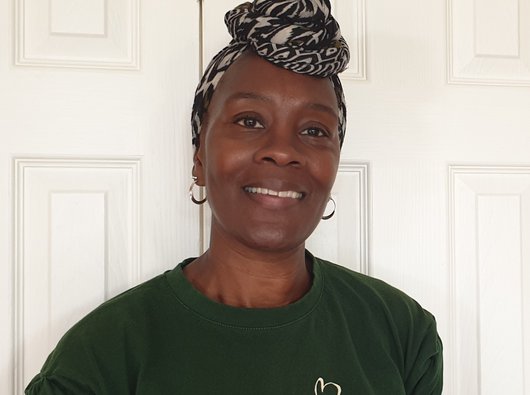Q&A with a psychotherapist
We asked five people with blood cancer what they wish they'd known during and after blood cancer treatment. We passed these questions to Surabhi, a psychotherapist at King’s College Hospital who supports people with blood cancer, and these were her answers.
What emotional support is available?
Emotional support can come in many forms. The most fundamental layer of support is from your personal support network. Many of the emotions people experience when going through a blood cancer diagnosis are just normal adjustment reactions. Your clinical nurse specialist is also trained to provide emotional support as part of their role. Some people may wish to access formal counselling or psychological therapy and it is best to ask your treating hospital about this. Some hospitals have in-house support and others do not. You can also contact a blood cancer support line for help finding counselling services.
How do I accept the impact that side effects are having on my day to day life?
Acceptance is not a single event, and it can go up and down for most people. Some days you might be able to take the side effects in your stride, whereas on other days these changes may bring up sadness or frustration. Try not to be hard on yourself if you do have moments of frustration. It’s not a sign of not coping.
During the tougher moments, being kind to yourself, recognising that your body has been through a lot, and that these changes are not your fault or a reflection on you as a person, can all help.
However, if the frustration and distress don't go away, and are affecting your daily life, you might want to consider accessing psychological support to help you cope with these.
How can I cope with the fear of not knowing what side effects to expect or how bad they will be?
Keep in mind what the medical team have said to you about what to expect, but remember that only time can answer how you as an individual might react to the treatment. People worry about how side effects will be because we feel like we need to be prepared in order to cope with it when it happens. However, it’s equally important to remind yourself that you can cope with things as and when they occur, and don’t need to anticipate them in order to deal with them in the moment. Reminding yourself that your medical team are there to support you through the side effects can also help with this uncertainty.
How do I know if what I'm feeling is normal?
Talk to your medical team about how you are feeling, because they will most likely tell you it's totally normal, and validate what your are feeling. Getting information from online forums and talking to other people with blood cancer will also help with this, as you'll realise you are not the only one.
Is it common to cry lots or feel sad during or after a blood cancer diagnosis?
Yes, it is normal to feel more tearful than usual soon after diagnosis or at key points during your treatment. Crying is one of the ways that we express a range of emotions including sadness, fear, anxiety, or stress. All of these emotional states are normal and common alongside a blood cancer diagnosis. Similarly, sadness is a very understandable response to diagnosis as you adjust to this news and what it means for you and your loved ones.
Who can I talk to about my mental health?
You can talk to any member of your treatment team about your mental health. While their primary role is to care for you physically, your doctors and nurses are also there to listen to how you are coping emotionally and try to find the best ways to support you with this. You can also access support through a blood cancer charities or speak to your GP if you are really struggling with your mental health.
How do I cope with other people's reactions to the way side effects change how I look or behave?
Other people's reactions can have a huge impact on our own emotional state and how we feel about ourselves. At the same time, their reactions are not in our control. As a starting point, if the reaction of someone close to you has upset you or caused you to feel a certain way, it is best to communicate this to them. Sometimes people may not realise the impact of how they react. Recognise also that how others react to you is often a reflection on how they are coping with your diagnosis and treatment, rather than being about you. This can help you to distance yourself a bit from others’ reactions. Recognising what you have been through, and communicating this to others if necessary, can also help. You might find our page about coping with changes to your body or appearance helpful.
"As my body and appearance continued to change, I felt less and less like myself. I experienced so many changes to the way my body worked, it felt alien to me!"
Yvonne, diagnosed with acute myeloid leukaemia (AML) in 2018.
Read Yvonne's story about the emotional impact of side effects, before and after treatment.

How can other people support me through my treatment?
Support from your network can come in many forms, and depends on what you need, and what they are able to do. Family and friends are usually keen to help in any way they can, but one thing you can do to help them, is ask for help. Asking for help can be difficult for some people, but it usually leads to you being supported and others knowing exactly what you need. Whether it’s practical things like helping with shopping or transport to and from hospital, or emotional support in the form of listening to you when you want to talk, or keeping your spirits up when you need a distraction - your family, friends or colleagues can be a valuable source of support.
What can I expect to feel as I go through different stages of treatment?
Talk to your team about what to expect at each stage of treatment so that you can feel prepared to some extent. At an emotional level, it’s understandable to feel distress whenever something changes. Key points might be at diagnosis, when treatment first starts, when treatment ends, adjusting to life after treatment or relapse. Everyone is different so it's best to speak to your team if you’re finding a particular stage of treatment challenging, so they can help you understand that how you’re feeling is common and valid, as well as where you can get further support if you want it.
How do I manage the fear of treatment not working?
The balance between our fears and our hopes is a delicate one. It’s quite understandable to feel afraid that the treatment may not work. How to cope with this depends on the type of person you are, and there is no right or wrong way of coping.
On a practical level, if you are afraid of treatment not being successful and you think it will help you to plan for this possibility, then you should do this. Some people might not wish to make plans because they feel anxious that they are somehow ‘being negative’ if they do this. This is not the case and if you are the type of person who likes to plan for all possibilities, it does not mean you are giving up hope.
On a psychological level, it’s completely understandable to feel anxious or unsettled about whether the treatment will work. But when you find your mind only dwelling on possible negative outcomes, try to gently remind yourself that this is just one of many possible outcomes. Some people find it helpful to reconnect with things that make them feel happy and hopeful, as this can balance out the fears. Trying to find something in the present which you can focus your energy and attention on can also help distract you, relax you, or help you find meaning while you wait for results. You could try some relaxation exercises. You might also find our page about coping after treatment ends helpful.
I'm scared I'll never get better. How do I get past this feeling?
It’s natural to want to be hopeful that you will get better but also worry this may not happen. Living with this uncertainty, which only time can answer, can be uncomfortable and unsettling. It's helpful to keep focussed on what your medical team have told you, for example they might have told you how long to expect certain side effects to last.
It can also help to change a definite negative conclusion (‘I will never get better’) to make it slightly more balanced ('nobody can know exactly when I'll feel better - I'll have to wait and see’). A more balanced view like this can hep us tolerate things for longer, and if possible, make the most of now.
Why do I feel the pressure to appear positive to others when I feel the opposite on the inside?
Usually, this pressure come from wanting to protect others from emotional pain at seeing us in pain. It can also come from believing that others cannot cope with it if you are honest with them about how you feel. In the second instance, we are making an assumption about how others would react, which may not be accurate. Or we may have this expectation that others want us to be positive, which might not be true either. Being honest and vulnerable to others may feel like taking a risk, but it can be a good thing.
Equally, all of us put on a ‘mask’ some of the time, depending on who we are interacting with at any given moment. You may not act the same way with everyone in your life. You may want to be more honest with some people than with others. There is no right or wrong in this – and it is okay if at times you want to say things are okay, especially if you don’t wish to have a long conversation about things.
How long does it take to feel normal again after treatment ends?
What a return to ‘normal’ means is different for different people and depends on your treatment. As your treatment ends and you gradually increase your activities, you may have more and more moments that feel ‘normal’. This can also go up and down. One day you might feel more ‘normal’, and another day you might feel less so. Generally, it’s helpful to view it more as a gradual return to the type of life you want to live after treatment ends, rather than a rigid expectation that you will go back to being exactly the person you were before treatment. It’s useful to have goals, and for some people these goals may be to return to as close a version of their former self as possible. There is no one single template of what ‘normal’ is – it is entirely subjective and specific to you as an individual. Some patients also introduce to their vocabulary the phrase ‘new normal’ – to reflect the fact things may be different after treatment, but you adapt to this new reality and still be you.
Will I ever stop thinking about blood cancer?
Moving on from treatment doesn’t mean you have to stop thinking about blood cancer. It is a significant event that you have experienced, and like other significant life events, may not be forgotten completely. Not thinking about blood cancer again might not be realistic, and it's certainly not necessary in order to enjoy a good quality of life.
Generally, if you remain well, the more time that passes after treatment ends, the more other life activities take up the space and time that was once devoted to treatment, and memories of blood cancer may recede further into the background. It might be that the types of thoughts you have about blood cancer shift over time. It might shift from something you associate with anxiety, fear, sadness or trauma, to something you also associate with your resilience, survival and growth. It might be there in your mind as a part of your life story, even though you might not think about it every day. Your mind may go back to it if you come across reminders of it even a long time after treatment ends.
If you find yourself regularly distressed by, or unable to shift, emotions you experienced at the start of your diagnosis or when you were in the middle of treatment, you may need some psychological support to help you with this.
"It's not really talked about, how what you’ve gone through can really impact you after treatment ends. I spent time mourning my past self and fighting to get back to who I was."
Anna, diagnosed with acute myeloid leukaemia (AML) in 2015.
Read Anna's story about how she coped with the phase of recovery that comes after treatment.

I'm having flashbacks. Is this normal?
Flashbacks are intrusive reminders of an experience in which we felt strong emotions (like fear or helplessness) in the face of a threat. Having this reaction to some aspects of your experience with blood cancer is not abnormal and can happen. Memories of specific episodes or moments can come back to you long after the event.
Flashbacks on their own don’t necessarily mean you need to access formal psychological support. The need for support depends on how recent the event was (it is quite common to have flashbacks to something that just happened), how distressed you feel about the flashback (it is possible to have a flashback but view it as a memory that doesn’t evoke an emotional reaction when it happens) and the extent to which the flashbacks affect your daily emotional well-being or functioning. If you are struggling emotionally because of the flashbacks, then you should seek help.
How do I cope with the fear of relapse?
Fear of relapse or fear of recurrence is a very common and understandable experience for anyone who has been through cancer treatment. While it is not possible to remove this fear entirely, it is possible to learn to live well alongside this fear, so that it doesn’t stop you from putting one foot in front of the other and move in the direction you want to in your life.
Sometimes the fear of relapse may give you an indicator of things that are important to you – either something you wish to do or to plan for, or something in terms of your values and priorities in life. If the fear of relapse helps you to make plans that are important to you, it can be a helpful thing.
The fear of relapse is a fear about a possible future scenario, but our minds can make us feel as if it were already happening. Try to recognise moments when you are allowing the fear of a possible future event that hasn't happened, stop you living as you wish to live right now in the present.
The important thing is that you don’t wait for the fear to go away before you start taking small steps towards living life as you want to.
I'm struggling, when should I seek further support?
You can seek support at any point you wish to, but especially when you feel like things are building up in your mind and you feel overwhelmed. If your distress is staying high, and affecting your ability to function as you would like to, it can be useful to seek support at this point.
If you're not sure where to start:
- Contact Blood Cancer UK and speak to our support service
- Speak to your healthcare team or GP - ask them what type of support might help you with how you are feeling.
Many people find counselling helpful. To find a free NHS counsellor:
- Ask your hospital team - some hospitals offer this themselves.
- Ask your GP.
- You can self-refer online on the NHS in England or through Breathing Space in Scotland. In Wales and Northern Ireland, speak to your GP.
To find a private counsellor, you can search bacp.co.uk

Find out more about side effects
Tips and real stories about side effects like hair loss, peripheral neuropathy, brain fog, sleep problems, infection risk, nausea and sore mouth.
